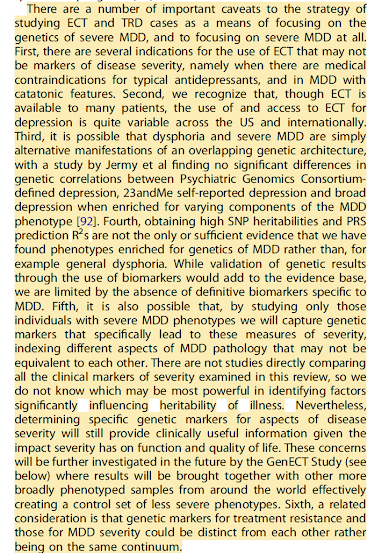The Genetics of Severe Depression: New Review
Out on PubMed, from international investigators, is this review:
The genetics of severe depression.
Mol Psychiatry. 2024 Oct 15. doi: 10.1038/s41380-024-02731-1. Online ahead of print.PMID: 39406997 Review.
Genome-wide association studies (GWASs) of major depressive disorder (MDD) have recently achieved extremely large sample sizes and yielded substantial numbers of genome-wide significant loci. Because of the approach to ascertainment and assessment in many of these studies, some of these loci appear to be associated with dysphoria rather than with MDD, potentially decreasing the clinical relevance of the findings. An alternative approach to MDD GWAS is to focus on the most severe forms of MDD, with the hope that this will enrich for loci of larger effect, rendering their identification plausible, and providing potentially more clinically actionable findings. Here we review the genetics of severe depression by using clinical markers of severity including: age of onset, recurrence, degree of impairment, and treatment with ECT. There is evidence for increased family-based and Single Nucleotide Polymorphism (SNP)-based estimates of heritability in recurrent and early-onset illness as well as severe functional impariment. GWAS have been performed looking at severe forms of MDD and a few genome-wide loci have been identified. Several whole exome sequencing studies have also been performed, identifying associated rare variants. Although these findings have not yet been rigorously replicated, the elevated heritability seen in severe MDD phenotypes suggests the value of pursuing additional genome-wide interrogation of samples from this population. The challenge now is generating a cohort of adequate size with consistent phenotyping that will allow for careful and robust classifications and distinctions to be made. We are currently pursuing such a strategy in our 50-site worldwide Gen-ECT-ics consortium.
The review is here.
And from the text:
This is an excellent review of genetic studies of severe depression. Of most interest to us is the use of ECT as a marker for disease severity.
Although the results are complex and not yet definitive, it appears that there is a larger genetic component to severe depression.
We have previously written about severity, heritability and episodicity as indicators of appropriateness for ECT.
We also have written about the important difference of positioning ECT as a treatment for severe illness, rather than TRD.
We look forward to the GenECT study.
Kudos to this collaboration.








Comments
Post a Comment